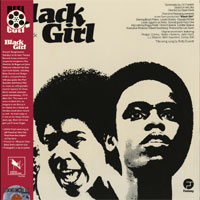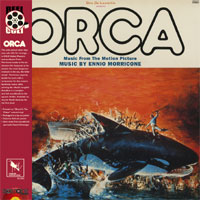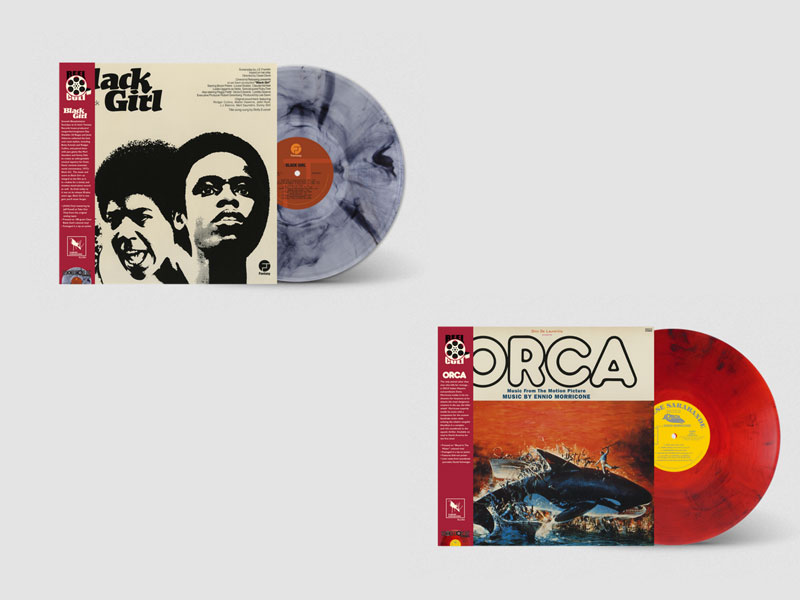Various Artists • Black Girl Varèse Sarabande/Craft Recordings RLC 001 Ennio Morricone • Orca Varèse Sarabande/Craft Recordings RLC 002
ust in time for this year’s Record Store Day comes these two limited-edition soundtracks from Varèse Sarabande/Craft Recording's new Reel Cult series. Black Girl, the first title in the series, returns to the shelves the 1972 compilation soundtrack (formerly available on the Fantasy label) to the movie of the same name. Second off the presses is the soundtrack to the 1977 movie Orca, with music by renowned Italian composer Ennio Morricone, first available only on the Japanese Tam label. According to Varèse Sarabande, the aim of the new Reel Cult series is to be “the ultimate soundtrack revival for cinephiles, crate-diggers, and nostalgia nomads alike. . . . Reel Cult resurfaces the wildest B-movie soundtracks, cult classic creature features, Blaxploitation cinema, Wild West revenge sagas, and spine-tingling horror flicks that never stopped spinning in your head.” With these two releases, they have easily achieved that goal. Each LP is pressed on heavyweight colored vinyl -- "clear black swirl" or "blood in the water" red -- and released in limited editions. Missing in action for over 50 years, Black Girl, produced by Fantasy Records A&R man Jesse Osborn along with writers/arrangers Ed Bogas and Ray Shanklin, is the soul-jazz soundtrack to the 1970’s Ossie Davis-directed movie and a journey into the era's funk and soul. It collects 15 tracks (ten instrumental, five vocal) into an easy listen featuring singers Betty Everett, Rodger Collins, J.J. Malone and Walter Hawkins and big-name Fantasy Records label jazz artists Sonny Stitt, Merl Saunders and John Hunt. Betty Everett, perhaps best known for her 1964 hit “The Shoop Shoop Song (It’s in His Kiss),” leads things off with “Black Girl.” The tune’s slow pace allows Everett’s voice to soar in achingly beautiful phrases. This song alone is worth the album’s cost of admission. Next, “B.J’s Step” brings an abrupt change of pace. It’s a dance tune with the expected rhythm, wah-wah guitar, brass and percussion required to get you off your butt and onto the dance floor. An animated Roger Collins sounds fine as he tells his story over punchy brass, electric bass and drums on “Get Me To the Bridge.” The gospel-inspired “Mother’s Day Song” features a rickety-sounding upright piano playing all alone. Recognize the tune? It’s “Abide With Me.” “Power,” a sultry instrumental follows with some nice muted trumpet from John Hunt. This one oozes '70s soul. The gospel standard “Abide With Me” returns on “Mother’s Day Song II.” This time, however, that same gnarly piano is joined by Merl Saunders on organ. Dreamtime returns with the sleepy “Black Girl Cue I,” featuring the tenor sax of Sonny Stitt. Lasting less than a minute, it’s way too short. Side one ends with a ho-hum vocal from J.J. Malone on “No World For Dreamers,” which leads into side two's opener, “I Am Your Mailman,” a funky, humorous tale featuring Roger Collins as a reliable, ubiquitous postal carrier. It’s dance-floor time as more catchy, instrumental funk percolates in “What It Is,” followed by trumpeter John Hunt adding some tasty fills to the rhythm and string-driven ensemble in “Earl (Still A Pearl).” Keyboardist Merl Saunders takes the organ stool on his funky, bouncy “Chock-Lite Puddin’” with a return to dreamtime on the too short “Black Girl Cue II,” followed by the thankfully short “Chock-Lite Puddin’ Cue.” Finally, the album’s closer," Sister,” features the vocals of Walter Hawkins and the entire ensemble in a tribute to the heroine of the film’s title. The album is presented in a sturdy, tip-on jacket complete with a replica OBI. The vinyl is flat, quiet, blemish-free and rests in a nice antistatic inner sleeve. Where it was pressed is not specified nor was there any information in the dead wax. Jeff Powell's all-analogue remastering provides excellent sound.
Who has not heard an Ennio Morricone soundtrack? If you’ve sat in a movie theater over the past 60 years, his often achingly lovely and dramatic music has massaged your ears on at least one occasion. Once Upon A Time In the West, Once Upon A Time In America, The Good, the Bad and the Ugly, Days of Heaven, The Mission, and The Thing are but a few of the over 400 movie and TV scores the late Italian composer penned to enhance our enjoyment of the visual experience. Active from the age of six until his passing at 91 in 2020, Morricone was considered one of the most fertile and greatest film composers of all time. Orca, a 1977 revenge film with Jaws in its DNA, pitted a killer whale against a brazen seaman. The movie starred a young Richard Harris, a younger Bo Derek, and Charlotte Rampling. It is a forgettable cheap thrill. Despite that, the soundtrack has its moments. Some of those include “Orca,” an irresistible, thoroughly Morriconian theme. When the action on the screen calls for it, Morricone responds with lots of tense, busy ensemble writing or ominous orchestral scoring, such as heard in “I Primi Ghiacci.” Other highlights include Morricone’s go-to soprano, Edda Dell’Orso, whose beautiful voice reprises the main Orca theme in “Dialogo Dei Ricordi.” Equally noteworthy is the terrifying, metallic clatter of manipulated cymbals, nervous strings and unique sound effects in “La Lotta, La Vittoria, La Morte.” Next, “L'ataco E L'errore” reprises the ominous strings and percussion of “La Lotta . . . ” and manages to slip in a subtle reference to John Williams’s score for Jaws. The album ends with “Orca-Finale,” a recap of the theme given the full, Morricone-style orchestral treatment. Album extras include a large full-color poster, on the back of which are notes, credits and an informative essay by film soundtrack guru Daniel Schweiger. Like Black Girl, the colored record is presented in a sturdy tip-on jacket and is flat, quiet, blemish-free. It also rests in a nice antistatic inner sleeve. Film-soundtrack admirers now have two releases to add to
their collections. The sound on both albums is fine, with Black Girl being
especially nice. (Could it be the all-analogue remastering on that one?) I thoroughly
enjoyed both of the albums and look forward to viewing the movies. |



